 |
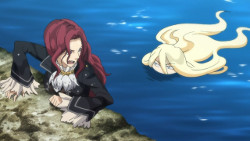 |
 |
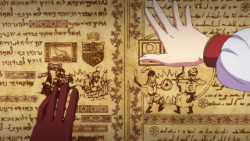 |
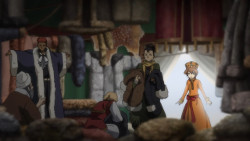 |
 |
 |
 |
 |
 |
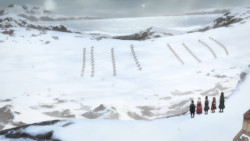 |
 |
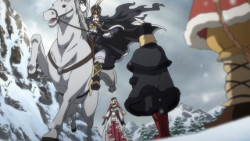 |
 |
 |
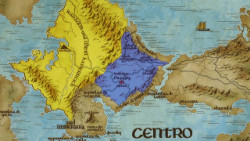 |
 |
 |
 |
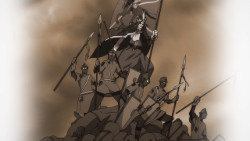 |
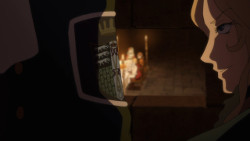 |
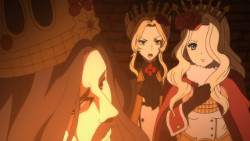 |
 |
 |
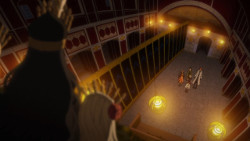 |
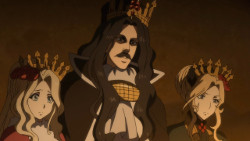 |
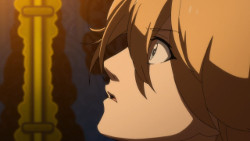 |
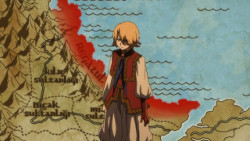 |
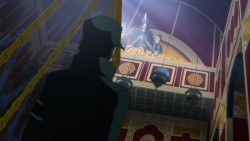 |
 |
 |
 |
 |
 |
 |
 |
「北の王国」 (Kita no Oukoku)
“The Northern Kingdom”
You know I’m sorely tempted at some point to write a post just on Altair’s various politics and economics. No sooner than the show leaves me with a grin on my face that it turns around and gives something even better than before. Seriously, the economics of agriculture and starting a war in the best manner possible? In the same episode? I don’t think my body can handle it all.
While I harp on it excessively every week, what keeps sticking out to me about Altair is how learned it is. Last time was all about the downstream effects of economic change, but this week? Bird poop. It might seem funny at face value, but sterco (or guano, sterco is Latin for feces) is actually a vital resource. Before the invention of artificial fertilizer (i.e. the Haber-Bosch process), crops in Europe and North America were fertilized with guano largely mined off the Peruvian coast, bringing about the dawn of modern agriculture and turning agriculturally self-sufficient states into food exporting monsters. To say it would make Urado wealthy is an understatement—guano mining could all but sustain Urado’s population yearlong and make the entire damn state an economic powerhouse at the same time. Abiriga’s identification of the stuff is a fairly important deal, and something Urado’s king at least understands generally, if not specifically. When your country lives or dies by the success of its growing season, anything making that aspect slightly more predictable will easily win out in the end. Balt-Rhein may be able to provide Urado with food, but that only shifts Urado’s reliance from themselves to a foreign power—not the ideal arrangement. Plus when it comes at the cost of military access, well, you’re effectively a dead man walking. Just ask Belgium how well such deals play out.
The big thing this week of course was not so much the economics as its results. Executing the competitor as a sign of good faith to the chosen party? Not as glorious a declaration of war as Leonidas kicking Persians down wells, but you have to give Urado’s enthusiasm credit. Ironically this makes for a good example of the law of unintended consequences too, showing no matter how well one may prepare for a specific outcome, someone, somewhere will always act in a manner running counter to that objective. For Mahmut that factor is Urado’s severity, and something he almost assuredly did not consider in the slightest. As a test of strength though it’s harder finding a more appropriate scenario. With Urado now set to bear the full fury of a thoroughly pissed off Balt-Rhein, it falls to Mahmut to help defend his new ally in a fight he did not create, but certainly had a hand in arranging. There’s no guarantee Turkiye will want to get involved (they are likely not militarily ready yet for a brawl) and Urado’s harshness to its enemies could test Mahmut’s own (albeit shifting) morality. Sure Venedik may be on board with handling Balt-Rhein now instead of later, but a fleet is useless in the mountains against an enemy out for blood. It’s a war with no clear path to victory and one that will take every ounce of Mahmut’s learning to come out of victorious. I don’t know if I could get more excited.
It may have only been a transitory episode to whet our appetites for the conflict to come, but with war finally upon us Altair seems ready to make the most out of its gradual buildup. With Balt-Rhein and Turkiye finally at loggerheads, it’s time for Mahmut’s real test and this story’s final reckoning. Fridays, they cannot come fast enough.
Preview
 |

https://randomc.net/image/Shoukoku%20no%20Altair/Shoukoku%20no%20Altair%20-%2015%20-%20Large%2001.jpg
https://randomc.net/image/Shoukoku%20no%20Altair/Shoukoku%20no%20Altair%20-%2015%20-%20Large%2034.jpg
https://randomc.net/image/Shoukoku%20no%20Altair/Shoukoku%20no%20Altair%20-%2015%20-%20Large%2002.jpg
Well, what happen to the Incas? they where in the same spot at their time, but in the end they got nearly extinguished
Why it happen? So, is here nearly the same? An Country at coastline is an “agriculturally power”. But History told us, nothing is for eternity
I’m glad I gave this series a try. Already a favourite of mine. Also, this is pretty much a Suikoden anime…
Got a question here, what nation is Urado based on? I can’t really pinpoint to anyone, or is it an amalgam of various nations?
The Urado king certainly has an interesting foreign affairs tactic.
https://randomc.net/image/Shoukoku%20no%20Altair/Shoukoku%20no%20Altair%20-%2015%20-%2026.jpg
Have a minister specialize in a country, with princesses in charge of the important ones I assume. It makes them able to specialize on the respective countries, though it also exposes them to heavy bias. Too minimize that effect, he then lets them duke it out in front of him when their interests clashes. The one that gives them the best deal gets his support.
Finally,
https://randomc.net/image/Shoukoku%20no%20Altair/Shoukoku%20no%20Altair%20-%2015%20-%2009.jpg
He certainly has a good eye for people. Talk about getting some of the best people for job. Some doesn’t even have to work in secret.
Urado seems to be based on Wallachia (present day Romania), because the king looks like Vlad the Impaler.
It’s definitely an amalgamation. Very likely Wallachia was the inspiration as Glutton mentions (especially considering Urado’s role as buffer and its land is similar to Wallachia’s), but the isolationism has no specific real world counterpart. Only thing coming to mind for me is Bosnia or Paraguay, but neither really captures Urado’s setup well.